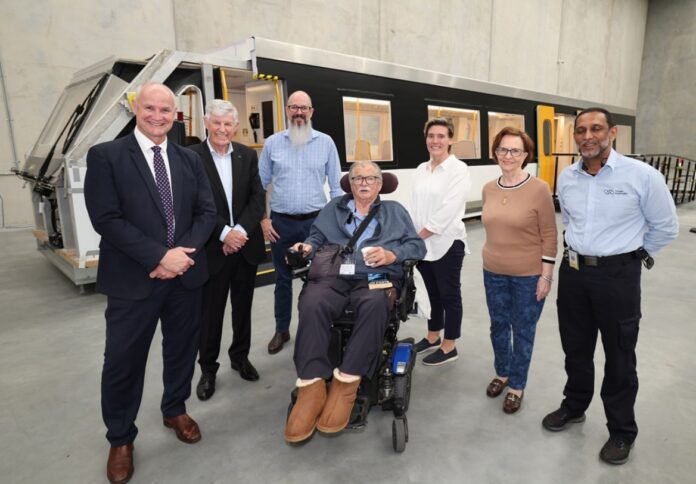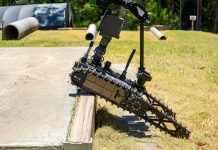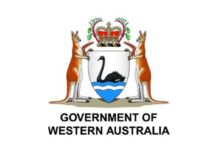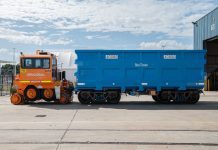
The first draft design of Australia’s most accessible passenger trains has undergone testing at a Low-Fidelity (Lo-Fi) train mock-up in Geebung, Brisbane.
This milestone is part of the Queensland Train Manufacturing Program (QTMP), which aims to deliver 65 six-car trains that set new standards for accessibility and inclusivity, the government said in a media statement.
Members of the disability sector, train passengers, drivers, and bike users were invited to inspect and interact with the mock-up, providing crucial feedback that will shape the final design of the trains.
This hands-on evaluation is part of an ongoing co-design process with the disability sector, ensuring that the trains are compliant, functional, and accessible for all passengers.
“The 65 QTMP trains will be the most accessible passenger trains ever in Australia, which is something I am very proud of,” said Minister for Regional Development and Manufacturing Glenn Butcher.
He continued, “The trains will have technology to reduce the vertical and horizontal gap between the train and platform, making it easier for people who use mobility devices, or are travelling with luggage or prams.”
The QTMP trains will be fully compliant with the Disability Standards for Accessible Public Transport (DSAPT) and are slated to be the “most accessible” rollingstock in the country when the first train is manufactured and begins testing in late 2026.
“Downer has a long and distinguished history of train manufacture in Queensland. We are proud to be delivering the most accessible train fleet in Australia on the Queensland Train Manufacturing Program,” said Stephen Kakavas, Rail Chief Operating Officer at Downer.
“The co-design process with various stakeholders in the disability sector has enabled us to better understand how we can finesse elements of design to ensure that public transport is available for everyone.”
In addition to the advanced accessibility features, the new trains will include 20 accessible spaces, 88 priority seats, two fully accessible toilets, hearing loops, USB-C charging ports at all seats, and four bicycle storage spaces on every train.
The trains will also feature wide, accessible paths and electronic levelling control, along with train boarding bridges to facilitate independent boarding for people using mobility devices.
“This is 65 new, accessible six-car trains built right here in Queensland, by Queenslanders, for Queenslanders,” said Minister for Transport and Main Roads and Minister for Digital Services Bart Mellish.
He added, “We are providing trains that will future-proof public transport for Queensland in the lead-up to the Brisbane 2032 Olympic and Paralympic Games.”
The mock-up was built by Fraser Coast indigenous-owned business Allweld Manufacturing, which was selected for its expertise in creating state-of-the-art models.
This mock-up will play a vital role in ensuring the train design not only meets disability compliance but also achieves the highest standards of functionality and accessibility for all passengers.
Disability advocate and spokesperson for the Passenger Rollingstock Accessibility Project Working Group, John Mayo, highlighted the importance of the co-design process.
“We settled on a goal to build the most accessible and inclusive trains in Queensland, and that’s what everybody’s been working toward,” Mayo said.
He continued, “Visiting the Low-Fidelity mock-up is a huge benefit because we get to see how people are actually interacting with the design.”
All 65 QTMP trains are expected to be in service by 2032, just in time for the Brisbane Olympic and Paralympic Games.
This project, supported by the Miles Government’s investment of over $335 million, is part of a broader initiative to enhance the entire New Generation Rollingstock fleet.
The QTMP will also support 1,300 jobs throughout the life of the project, providing a significant boost to the local economy.
“This is in stark contrast to the LNP, who sent train manufacturing and job opportunities overseas and cut industry support programs, which resulted in thousands of job losses,” Mellish added.
The QTMP is not only setting new standards for accessibility but is also leaving a lasting legacy for Queensland’s train manufacturing industry, with substantial investments in local communities through the supply chain and employment.
“I think this process is as good as it gets in terms of a co-design process for a major project,” Mayo concluded, praising the collaborative efforts between designers, the project team, and the customer group.



















